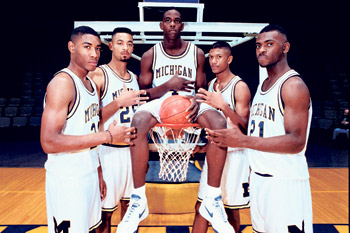Time To Make Peace With Fab Five

In this November 1991 file photo, Michigan’s Fab Five (from left) Jimmy King, Juwan Howard, Chris Webber, Jalen Rose and Ray Jackson, pose in Ann Arbor, Mich. | AP photo/file
If not for CBS cameras staking out the parking structure, the viewing public may never have known for sure. Webber was there, with his wife, Erika, and wearing a Michigan stocking cap.
For the former Detroit Country Day high school baller, it was the closest he had been to a Michigan function since shortly after he called the infamous timeout during the closing seconds of the 1993 title game against North Carolina.
The time-out, the investigation into impermissible benefits and the attempt of his alma mater to get more than $600,000 in restitution from one of its greatest players, drove a stake so deep that it even fractured the relationship with the four guys he was closest to, his Fab Five counterparts.
Two decades after Jalen Rose, Jimmy King, Ray Jackson, Webber and Juwan Howard made history, and 10 years after Webber was sentenced to official obscurity, it’s time to mend fences.
The title game was the first sign of a possible thaw. Webber didn’t join his counterparts, preferring to watch the game from a private suite high above the court. But he was there, at the game, posting a happy photo and tweeting his support. That may not sound like much, but after so many years of anger and frustration, hurt feelings and the lack of any regret, it was huge.
When asked about the Fab Five’s presence at the game, Michigan president Mary Sue Coleman wisely turned the attention to the players on the court. Her only other option would have been to discuss the now middle-aged men in the broader context of all alumni.
Coleman has gone on record saying the NCAA finals banners that were taken down as part of the school’s self-imposed penalties, should forever remain in storage. But that doesn’t mean the door has been locked.
Because the school forfeited games during Webber’s tenure and have asterisked his records, it makes little sense to hang banners celebrating an accomplishment that didn’t officially happen. Plus, it would require NCAA approval. To do so without NCAA president Mark Emmert’s official blessing would be risky.
For true reconciliation to happen, both sides need to admit to past wrongs.
Webber must, for the first time, speak about his acceptance of cash from booster Eddie Martin – when did it begin, how much did he get and why did he lie about the relationship for so long. Perhaps no one will know how much money changed hands.
Reports are that Webber, between his freshman year in high school through his sophomore year in college, received more than $280,000 from Martin, who allegedly used profits from an illegal gambling operation to spread money among some 1,000 Detroit area athletes. Whether that amount includes money given to Webber’s father, Mayce Webber Jr., never has been determined, but in 1994, according to federal investigators looking into Martin’s actions, Webber wrote a check for $38,200 to repay Martin.
In a 2003 Detroit News article, Gregory F. Lord, an attorney for Martin, called the figure a “low, low estimate.”
For the university’s part, it must acknowledge its own sins. Michigan has done little over the years to support Webber in the aftermath of the time-out – later video clearly shows someone signaling timeout from the bench.
It also must admit, in whatever veiled manner is thought most appropriate, that Webber, being the biggest star, was singled out as the scapegoat in a scandal that involved several players and a couple of coaches.
Finally, Michigan must let it be known that its attempt to collect $695,000 in restitution from Webber was irresponsible, if not hypocritical, considering the corruption of NCAA rules went far beyond the control of a teenage basketball player.
No one should excuse Webber for his transgressions. He agreed to abide by NCAA rules and did not. For that he deserved to be punished, and he was.
Now it’s time to forgive. Both parties would be better served building for the future instead of clinging to the past.



